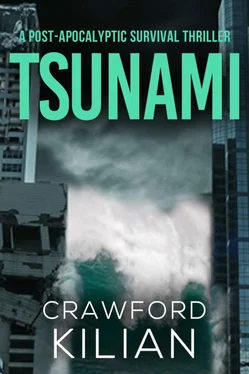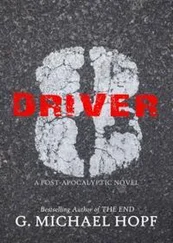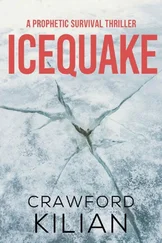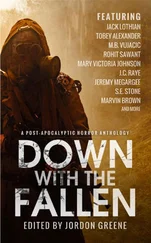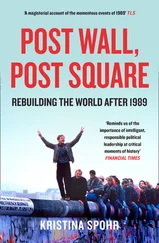Don got back on his bike and pedalled across the empty bridge. He thought he ought to feel depressed and defeated by his own hypothesis; instead he felt excitement and the anticipation of a challenge.
* * *
Neogene was just another low sprawl of cinder block along a broad suburban road lined with high-tech industries. Don left his bike in the empty parking lot and tried the front door: locked. Walking around the building, he saw the glow of a light behind curtained windows and found a nearby door that opened unexpectedly. Taking a flashlight from his backpack, he walked in.
Light fell through an open doorway into the dusty corridor. Don walked towards it and called out, “Hello, this place.” He stepped through the doorway.
Dennis Chang, pale and unkempt, sat at a table at one end of a long laboratory. A Coleman lantern threw white light over the papers strewn on the tabletop.
“Hi, Dennis. It’s Don Kennard; we met on the Bay Bridge.”
“I’ll be damned. Hello. Come on in.” Dennis got up, shook Don’s hand, and sat him down in a battered old armchair. Then he lit a Bunsen burner and put a flask of water on to boil.
“You’ve got natural gas?”
“Unnatural gas, brewed by my little monsters. They’re producing enough to keep part of the lab warm and to heat enough water for Mei Ming and me.”
“You’re living here, then.”
“Just the two of us. Our staff are scattered all over the place. So it’s a mom-and-pop operation, just like my folks’ grocery store. Mei Ming’s gone to bed, or I’d introduce you. Hell, you’ll stay the night and meet her in the morning. You even get a hot shower if you want one.”
“My God, that sounds wonderful.”
They talked easily for a time about how things had gone in the past month. Over his second cup of tea, Don asked: “What would you need to get back in business?”
“Five or six technicians, people with experience in recombinant DNA. Some tradesmen — plumbers, sheet-metal workers, carpenters. Maybe three or four molecular biologists. A couple of clerical types. Why, you want to finance me?”
“Could you be in mass production of methanogen by this autumn, if you had that many people?”
“Mass production meaning how much?”
“Enough to supply the basic energy needs of the Bay Area — call it three million people.”
Dennis guffawed. “Wow, from mom and pop to A & P. Yes, by God, we could if we had some extra help at a couple of crucial points. We’ve got one big technical problem to solve — the gene for methane production doesn’t always take, so some cultures don’t produce for more than five or six generations. It’s nothing we can’t fix, but it’ll take awhile. This lab alone could produce ten thousand cubic metres a day. And you could export cultures to anywhere. Feed ‘em garbage, dead grass, wood chips, and they’ll turn it all into methane.”
“Good enough. How would you like to make a deal with some of the Bay Area locals, Dennis?”
* * *
It took four more days to talk to the Berkeley local, obtain a sailboat from Mrs. Debney’s salvaged flotilla, equip it, and sail out of San Francisco Bay.
The boat was an eight-metre sloop, the Naiad . It reminded Kirstie of boats she’d sailed with Don in the Caribbean and Mediterranean, and it cheered her up just to be aboard as Don piloted it through Golden Gate.
“This is fun. I’ll feel damn guilty if we don’t find your oil tanker,” Kirstie said.
Don smiled. “We’ll find it.”
Naiad ran down the coast with the wind from the northwest, and that night lay at anchor off the tip of the Monterey peninsula. The sea was choppy. In Pacific Grove and Monterey and Seaside, a few lights twinkled: candles, mostly, though now and then car headlights flashed out.
“Somebody’s still got gasoline,” Don said as they sat on deck drinking beer. “Probably soldiers. They seem to have a real grip on things here.”
“1 wonder what they’ll think when they see us out in the bay tomorrow,” Kirstie said.
“We’ll see. I wouldn’t like it if they tried to interfere. Soldiers make me nervous.”
Next morning at dawn, in wind-driven rain, Naiad crossed the bay towards Moss Landing. The tanker moorage was about nine kilometres offshore, according to Don’s charts, in about a hundred metres of water. The Sitka Carrier had been overwhelmed at the moorage and probably driven some distance towards shore before hitting bottom.
Still, when he looked at the actual area where the tanker might be, he wondered if it could be found after all. First of all, the charts were now obsolete: the coastline was sharply changed. Sandbars loomed up where water should be deep. Surf broke around rocky islands which had once been part of the shoreline and now stood well out in the bay. The area within which the tanker lay was perhaps five or six kilometres wides and ten long.
He took some heart from the oil slicks streaking the water; they were certainly diesel fuel, and not noticeably decomposed by long exposure, so the tanker could not be completely buried. If the currents in the bay had not changed too much, he should be able to trace the slicks to their source.
After three hours of tacking back and forth across the eastern reaches of the bay, they found themselves just north of a heavy slick that trailed away to the south.
“This must be it,” Don said. “The current still runs south along the shoreline, and the speed must be a couple of knots. That means we should be right above the tanker.”
Kirstie secured the wheel and dropped anchor. “It’s not the nicest place you’ve ever brought me diving.”
The water was cold, a soupy beige with little visibility. He and Kirstie followed the anchor cable down and reached bottom at eighty metres. Visibility was still bad, not much more than a metre or two, but each carried a powerful lamp strapped to one wrist and swam in a fuzzy yellow glow.
Since compasses were no longer reliable, they had improvised a survey pattern: tying a thin line to the anchor cable, they reeled it out about a hundred metres. Then they turned to their right and began a slow sweep, swimming just above a lifeless bottom of mud and jumbled stones. The sweep revealed nothing. Don and Kirstie floated unmoving for a few seconds, until the current began pushing them; they turned and followed the current’s direction, unreeling another line tied to the first.
Don actually touched the hull before he saw it; coated with mud, it blended in with the murky water. But just below the mud was cold metal. Kirstie squeezed his arm and pointed to her left; he followed her. They swam for a long time, along the length of the hull, and then, as it began to taper towards the bows, they ascended.
The Sitka Carrier , they saw, had capsized and struck bottom upside down. Its superstructure lay crushed and inaccessible; its hull must be largely intact and holding its cargo. Thirty metres from the bottom, the hull curved sharply away from the vertical and rose more gently for another fifty metres until it reached the keel. The water here shone differently in their lamps; oil droplets gave it a brownish tinge.
The breach in the hull, when they found it, was unexpectedly small — a torn weld perhaps six metres long and no more than ten centimetres wide. Diesel oil rose from it in a black, shimmering sheet that vanished into the gloom above. Cautiously, Don and Kirstie circled the breach and searched for others. Apart from a few small cracks, they found none.
Don secured a powerful magnet to the hull and attached a cable to it. An inflatable buoy clipped onto the cable; compressed air lifted it to the surface. They followed it up and found themselves a couple of hundred metres from Naiad .
Читать дальше
